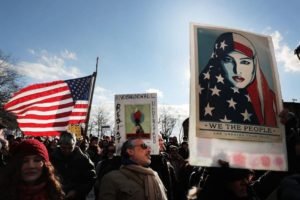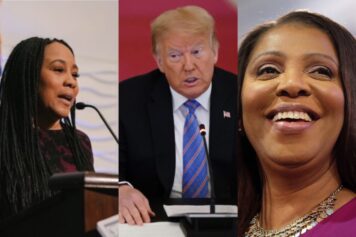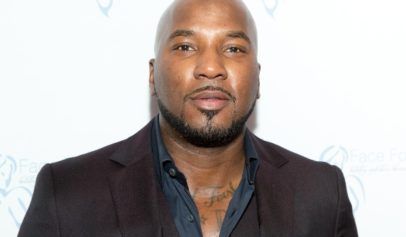
Protesters gather for a rally in Battery Park on Jan. 29, 2017, in New York City, to protest President Donald Trump’s new immigration policies. Photo by Spencer Platt—Getty Images
Newly elected President Donald Trump held fast to his campaign promise(s) on Friday, Jan. 27, by signing an executive order that permanently barred Syrian refugees from entering the U.S. and temporarily suspended all refugee admissions into the U.S. from seven majority-Muslim nations — Iran, Iraq, Libya, Somalia, Sudan, Syria and Yemen.
By Saturday night after a huge public outcry, a federal judge in New York issued an emergency stay on a portion of Trump’s ban, halting the deportation of refugees detained at airports across the country. The stay, imposed by U.S. District Court Judge Ann Donnelly, was the result of a federal lawsuit filed by the American Civil Liberties Union on the behalf of two Iraqui men who were held at New York’s JFK airport following the president’s executive order, The Hill reported.
Similar rulings were made in Massachusetts, Virginia and Washington state to prevent the government from sending detained refugees and those with valid visas back overseas. Some detainees were ultimately cleared to enter the U.S., while others were left in limbo. It is still unclear what criteria officials used to determine which detainees could be admitted and who had to stay out.
“Clearly the judge understood the possibility for irreparable harm to hundreds of immigrants and lawful visitors to this country,” Anthony D. Romero, executive director of the ACLU, said in a statement. “Our courts today worked as they should as bulwarks against government abuse or unconstitutional policies and orders. On week one, Donald Trump suffered his first loss in court.”
The president’s executive order imposed a 120-day ban on refugee entries into the country, blocking nearly all arrivals of non-native U.S. citizens from war-ravaged countries like Syria, where the United States is arming rebel groups as well as actively engaged in military operations against the designated terrorist group ISIS. The order didn’t affect naturalized U.S. citizens, but several students, tourists and green card-holding permanent U.S. residents traveling from the seven countries were stopped and detained at U.S. airports and abroad, according to The New York Times. A number of people were ultimately barred from entering the U.S. and deported back to their home countries.
“It’s countries that have tremendous terror,” Trump said during a recent interview with David Muir of ABC News. “It’s countries that people are going to come in and cause us tremendous problems. Our country has enough problems without allowing people to come in who — in many cases or in some cases — are looking to do tremendous destruction.”
Trump’s immigration ban, however, conveniently excluded Muslim countries in which he has multimillion dollar business interests and gives preference to persecuted religious minorities in these countries, specifically Christians.
The president’s new immigration policies also enforced what Trump called “extreme vetting” of visa applications from refugees from countries beleaguered by terrorism, Bloomberg News reported. All this comes just days after Trump vowed to make good on his promise to build a wall along the U.S./Mexico border, asserting that Mexico would foot the bill.
The controversial new ban on Muslim immigrants and families seeking refuge in the “Land of Opportunity” sparked outrage from Americans across the country, prompting heated protests at airports from Atlanta’s Hartsfield-Jackson International to New York’s JFK. Demonstrations even took place near the gates of the White House and Trump’s recently opened international hotel, just blocks from his new home. Thousands of protesters from across the U.S. gathered to speak out against the president’s discriminatory new policies, with rallies going on through Saturday and Sunday night.
“I was hopeless,” said Muhamad Alhaj Moustafa, a Syrian immigrant who came to the U.S. to train as a doctor and whose wife was deported back to Qatar as a result of the president’s executive order.
“But this, this gives me hope,” Moustafa told CNN while pointing to the crowd of protesters gathered at the airport waving welcome signs and chanting: “No hate, no fear, immigrants are welcome here.”
Aside from the public backlash and huge fallout, Trump’s new immigration ban proves to be a bit problematic in other ways. For one, it excludes Muslim-majority nations like Turkey and the United Arab Emirates, which Trump has significant business ties to. Bloomberg News reported that Trump has a $5 million licensing deal to use his name on two currently operating luxury towers over in Istanbul and a management deal in Dubai with Damac Properties Dubai Corporation for a golf course and luxury villas that are currently being built.
Most notably, the immigration ban excludes Saudi Arabia, the nation from which a majority of the 9/11 terrorists hailed. Trump currently has business dealings there, too, according to Bloomberg News.
Trump has asserted that his newly imposed executive order isn’t a ban on Muslims per se, as there are a number of other Muslim-majority nations that aren’t on his list. But the fact that the president promised priority admittance into the U.S. for Christians and other persecuted religious minorities from the seven countries poked a gaping hole in his argument.
Christians in the Middle-East have been executed in large numbers. We cannot allow this horror to continue!
— Donald J. Trump (@realDonaldTrump) January 29, 2017
Trump’s preferential treatment, however, has proven to be more harmful than helpful to Christians and religious minorities reportedly protected by the ban. Two Christian families from Syria who fled to the U.S. to escape religious persecution were detained at Philadelphia International Airport on Saturday, Jan. 28, and ultimately booked on a flight back home, NBC News Philadelphia reported.
“This is like a nightmare come true,” said Joseph Assali, a relative of the two families. “They are all Christian citizens and the executive order was supposed to protect Christians fleeing persecution.”
There’s no word on how the executive order will be interpreted and applied by federal officials and border agents in the coming weeks.


